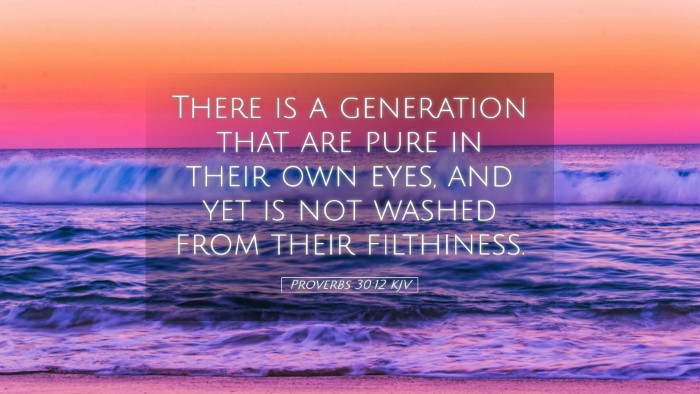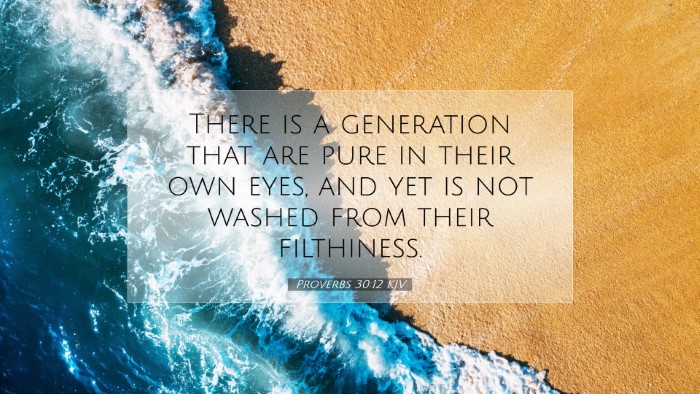Commentary on Proverbs 30:12
Proverbs 30:12 states: "There is a generation that is pure in their own eyes, yet is not washed from their filthiness." This verse serves as a powerful commentary on human nature and self-perception, especially as it pertains to spiritual and moral purity.
Contextual Overview
The Book of Proverbs is rich in wisdom literature, often contrasting the attributes of the wise and the fool. In this particular passage, we find the influence of a generation that considers itself righteous, yet lacks the true cleanliness desired by God. The juxtaposition between self-perception and reality is pivotal in understanding this warning.
Matthew Henry’s Insight
Matthew Henry emphasizes the danger of pride that leads to self-deception. He notes that “this generation” refers to those who are unaware of their moral failures and impurities. Henry outlines several key observations:
- Self-Deception: The term “pure in their own eyes” illustrates the delusion that can accompany moral and spiritual blindness. Individuals may think they are upright due to societal standards rather than divine ones.
- Reality of Filthiness: Despite their perceived purity, these individuals are not “washed from their filthiness.” This signifies a deeper moral corruption that they are either unaware of or refuse to acknowledge.
- Generational Trends: Henry suggests a generational critique, pointing out that such attitudes are often prevalent among youth, as cultural norms may reflect a departure from biblical teaching.
Albert Barnes’ Perspective
Albert Barnes offers a detailed analysis of the phrase “yet is not washed from their filthiness.” He indicates that this metaphor of washing is significant:
- Need for Cleansing: Barnes points out that cleansing indicates a necessity for repentance and atonement, highlighting the biblical truth that all have sinned and fall short of God’s glory (Romans 3:23).
- Illusion of Purity: He also discusses how people’s views on purity can be influenced by outward actions rather than inward condition. A generation may pride itself on social justice or moral causes while neglecting personal sin.
Adam Clarke’s Interpretation
Adam Clarke takes a slightly different angle, focusing on the nature of ‘filthiness’ as more than just physical or ethical stains. Clarke asserts that true purity requires not only the absence of obvious sins but also an active engagement in righteousness:
- Spiritual Blindness: Clarke argues that those who consider themselves pure are often spiritually blind, lacking the insight to recognize their own sinful nature.
- Importance of Self-Examination: He emphasizes the need for believers to engage in self-examination and humility, aligning with Paul’s exhortation to test oneself (2 Corinthians 13:5).
Theological Implications
This verse provokes significant theological reflection on several fronts:
- The Nature of Sin: The idea that individuals can presume their purity can lead to a complacent and dangerous lifestyle. The theological assertion is that sin is not merely a behavioral issue but a heart condition requiring divine intervention.
- Grace and Redemption: The reality of filthiness calls for grace. The Gospel invites all who realize their state of uncleanliness to approach Christ, who offers true cleansing through His sacrifice (1 John 1:9).
- Call to Righteous Living: As followers of Christ, there is a call not only to live righteously but to pursue holiness and transparency, as seen in Ephesians 5:8-11.
Practical Applications for Today’s Believers
For pastors, students, theologians, and scholars, the implications of this verse can profoundly influence teaching and preaching:
- Encouragement to Engage in Humility: Cultivating a heart of humility is essential. Reminding congregations that everyone has areas of sin that require God’s ongoing work can help combat self-righteousness.
- Fostering Accountability: Encouraging communities to create spaces for accountability where individuals can speak about their struggles without fear can promote a true understanding of what it means to be 'washed'.
- Deepening Theological Education: Pastors and students of Scripture should delve deeply into the nature of sin, redemption, and grace, continuously renewing their understanding of biblical anthropology.
Conclusion
Proverbs 30:12 encapsulates a critical warning for every generation about the peril of self-deception. The insights from Matthew Henry, Albert Barnes, and Adam Clarke enrich our understanding and urge us to seek true purification through Christ. It is essential for believers to constantly assess their spiritual condition, seek God’s cleansing, and embrace the transformative power of the Gospel.


